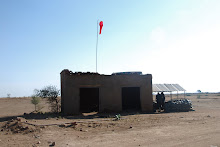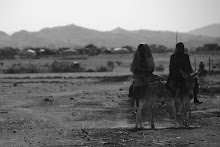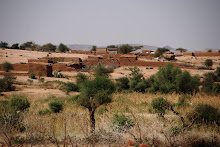The 2nd regular Human Rights Forum in West Darfur this past Tuesday was either a huge success, an unmitigated disaster, or somewhere in-between – depending on how you look at it.
Flying home from the event, the small plane bounced over heat waves rising from the desert floor. Before long, a man in front of me leaned forward to vomit. As my seatmate handed him an air bag with one hand, she turned to me and cheerfully exclaimed, “I think today was great success… I mean, the government spoke openly about sexual violence!”
They did, I guess. Technically, the Government Human Rights Council brought up sexual violence only to accuse international monitors of fabricating reports. But, in the strange world of human rights reporting in Darfur, where symbolism often triumphs over substance, this could be a great leap forward.
The forum is intended to be a dialogue between the Government of Sudan and human rights monitors about modalities of reporting, such as monitors’ access to prisons and medical verification – But a lot can happen (or go wrong) when the universalist ideals of the human rights movement confront the realpolitik of implementation; When the West meets the Rest; And when human rights monitors actually meet the ‘monitored.’
Darfur human rights actors – both local and international, grass roots and institutional - have relied on a strategy to name and shame the perpetrators of violence in order to create public pressure and encourage behavioral change. The Save Darfur Coalition, Sudan divestment campaign, and even some rebel groups, among others, have been wildly successful in creating public awareness of human rights abuses in Darfur.
This public awareness has, in turn, influenced human rights reporting in Darfur - both in the way it is conducted and the in attitude that participants take towards each other. Now, although the nature of the conflict has changed from large scale atrocities to more subtle posturing and rampant insecurity, the legacy of the early movement remains.
The forum embodies the awkward situation existing today, where ‘namers and shamers’ – international human rights organizations - are expected to come face to face and work productively with the ‘shamed’ – the Sudanese Government and other perpetrators – to create change.
The Sudanese Government representative opened the reporting debate by cataloguing faults in published UN reports, implying that the incidents of sexual violence were wildly exaggerated and poorly documented, and that the language was imprecise and inflammatory. The human rights team leader deflected responsibility by saying her office did not specifically author the reports mentioned. At lunch I asked the team leader how she thought it went. “I think we did really well,” she said. “We had an answer prepared for that one.”
Like my colleague on the plane, she is right. But neither the answer or the question engaged the modalities of reporting and verification, nor addressed ways to improve communication or reduce the incidents.
It seems both sides want to move forward from this ideological imposed impasse. The human rights movement wants to transform itself from an outside whistle-blower to an engaged and relevant actor on the ground. To do this they must give up showmanship for scholarship, journalism for legalism, and symbolism for substance.
The Sudanese government wants to free itself from its negative reputation regarding human rights abuses in order move forward into new elections and new relationships with the international community. But to do so, it must listen and respond to the concerns voiced by international monitors.
The forum’s existence reflects the roles the two sides want to play, not the ones they currently do - but it offers great hope for the future.
Friday, April 24, 2009
Subscribe to:
Post Comments (Atom)













































1 comment:
Well articulated.
Post a Comment